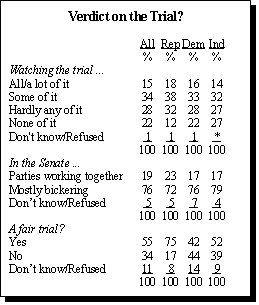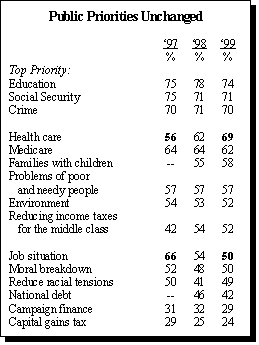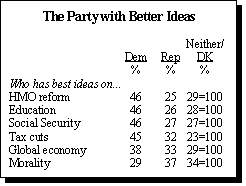Introduction and Summary
 President Clinton’s impeachment trial has neither engaged the attention of the American public nor changed its mind about the continuance of his presidency. The public gives Clinton high marks for his job performance, expresses satisfaction with the state of the nation and registers even more contentment with their own lives than just two years ago. Most also say that Clinton’s upcoming State of the Union address is at least as important as past speeches: 51% as important, 27% more important.
President Clinton’s impeachment trial has neither engaged the attention of the American public nor changed its mind about the continuance of his presidency. The public gives Clinton high marks for his job performance, expresses satisfaction with the state of the nation and registers even more contentment with their own lives than just two years ago. Most also say that Clinton’s upcoming State of the Union address is at least as important as past speeches: 51% as important, 27% more important.
Fewer than one-third of Americans are paying very close attention to the Senate proceedings and just 15% say they have watched all or a lot of the live coverage of the trial. Fully 69% say that the trial has not changed their opinion about whether the president should be removed from office or resign. A steady two-thirds of the public wants Clinton to remain in office. Just one-in-three say Clinton should be removed from office, and, in a separate question, even fewer say he should resign.
The public judges the Senate trial much the way it did the House proceedings. An overwhelming 76% say the Senate is mostly bickering, compared to 19% who say they are working together. When asked to compare the Senate and House proceedings, a 43% plurality see the level of partisanship as the same.
As in December, none of the major actors in the proceedings is given favorable marks. Congressional Republicans are given much lower ratings for their handling of the investigation (32% approve) than are Democrats (44% approve) or Bill Clinton (45% approve). The media too is rated poorly (35% approve). The one exception is Supreme Court Chief Justice William Rehnquist who gets a 50% approval ratings, but this may reflect his stature more than an appraisal of his performance. (Only 19% of Pew respondents named him as presiding over the trial, compared to 48% who identified Larry Flynt as the publisher paying for information about marital infidelity by members of Congress.)
 A 55% majority of Americans think the president will get a fair trial. Despite the lack of interest in the Senate proceedings so far, the public is divided over whether parts of the trial should be conducted in closed session: 52% say the trial should be entirely open, 43% say it’s okay to close parts. Fewer Democrats than Republicans or Independents think the trial will be fair. All three groups are divided as to whether it should be entirely open.
A 55% majority of Americans think the president will get a fair trial. Despite the lack of interest in the Senate proceedings so far, the public is divided over whether parts of the trial should be conducted in closed session: 52% say the trial should be entirely open, 43% say it’s okay to close parts. Fewer Democrats than Republicans or Independents think the trial will be fair. All three groups are divided as to whether it should be entirely open.
High Marks for Clinton and the Nation
A full year of the Clinton-Lewinsky scandal has had little negative impact on how Americans judge the country or the president’s job performance and overall record. In fact, more people are satisfied (53%) with the way things are going in the country than was true in early 1998 before the scandal broke (46%). Further, as many Americans say Clinton’s accomplishments will outweigh his failures as said that about Ronald Reagan at a comparable time in his second term (50%-34% Clinton; 52%-38% Reagan).
The politics of presidential impeachment color Americans’ view of how things are going in the country today. Just 41% of those who think Clinton should be removed from office are satisfied with the state of the nation, compared to 60% of those who do not think Clinton should be removed.
 Perhaps underpinning this view of the president and the country, Americans express high levels of satisfaction with various aspects of their own lives and continued optimism about their financial futures. Today, 45% of the public says they are very satisfied with their standard of living, up substantially from 35% in late 1996. Similarly, 37% say they are very satisfied with their household income, up from 27% in 1996. Americans are even happier about their family lives (71% are very satisfied) and with their housing situations (61%).
Perhaps underpinning this view of the president and the country, Americans express high levels of satisfaction with various aspects of their own lives and continued optimism about their financial futures. Today, 45% of the public says they are very satisfied with their standard of living, up substantially from 35% in late 1996. Similarly, 37% say they are very satisfied with their household income, up from 27% in 1996. Americans are even happier about their family lives (71% are very satisfied) and with their housing situations (61%).
The increase in economic satisfaction over the past two years has been somewhat greater among those who are more affluent. And while African-Americans express lower satisfaction than whites with many aspects of their lives, the number of blacks who say that they are happy with their standard of living is up substantially from two years ago. Today, 42% of blacks say they are very satisfied, compared to just 19% in 1996.
Overall, the public continues to express reservations about education in America today, although parents are much more satisfied than non-parents. Some 46% of parents are very satisfied with their children’s education, compared to just 15% of non-parents who are very satisfied with the education children are getting.
Priorities
 As the 106th Congress takes office, the public agenda remains much the same as it was prior to the 1998 elections, with at least 70% of Americans emphasizing education, Social Security and crime as top priorities. This is no different from January 1998, when these same three issues led the list of the public’s concerns. What is different in 1999 is the emergence of health care reform as a major issue: 69% list it as a top priority, up from 62% last year and 56% in 1997.
As the 106th Congress takes office, the public agenda remains much the same as it was prior to the 1998 elections, with at least 70% of Americans emphasizing education, Social Security and crime as top priorities. This is no different from January 1998, when these same three issues led the list of the public’s concerns. What is different in 1999 is the emergence of health care reform as a major issue: 69% list it as a top priority, up from 62% last year and 56% in 1997.
Furthermore, as the country continues to enjoy economic prosperity, Americans are less concerned about employment issues than they were in past years. Only 50% of the public lists jobs as a top priority, a drop of 4 percentage points since 1998 and 16 percentage points since 1997. Among 15 domestic and economic issues, the public places the least emphasis on reducing the federal debt, reforming campaign finance and cutting the capital gains tax.
In general, both Republicans and Democrats rank the same issues — education, crime, Social Security and health care — as top priorities, but they give relatively different rankings to each. Health care reform takes lead post for Democrats (84%), but fifth place (56%) among Republicans. Conversely, while 64% of Republicans list dealing with moral breakdown as a top priority (ranking it 3rd), only 44% of Democrats agree. Morality does not make the list of top ten Democratic priorities. This is also true of Independents, only 43% of whom rank it as a top priority
There are significant gaps between the priorities of blacks and whites, with the greatest divide on employment. Fully 85% of blacks rank improving jobs as a top priority, compared to only 45% of whites. African-Americans are much more likely than whites to emphasize reforming health care (91% vs. 66%), helping the poor (70% vs. 55%), dealing with the problems of families with children (75% vs. 55%), protecting Medicare (78% vs. 59%), and reducing racial tensions (64% vs. 46%).
Not surprisingly, senior citizens rank shoring up the Social Security (89%) and Medicare (81%) systems above all other items. Americans under age 30 place a lower priority on these two issues: 56% give Social Security a top ranking; 47% place Medicare this high. Conversely, young adults are much more likely than those 65 years and older to rank dealing with the problems of the poor (61% vs. 44%) and the environment (60% vs. 47%) as top priorities.
Women outnumber men in their emphasis on crime (79% vs. 61%), Medicare (67% vs. 57%), the environment (57% vs. 46%) and racial tensions (56% vs. 41%).
Democrats with Agenda Edge
 On the public’s top priority items, the Democratic Party now enjoys a huge advantage over the Republicans. When it comes to improving education, protecting Social Security and regulating managed health care plans, the Democrats outrank the Republicans as the party with the best ideas by margins as great as 21 percentage points. The Democrats also have a clear edge on the classic GOP issue of tax cuts.
On the public’s top priority items, the Democratic Party now enjoys a huge advantage over the Republicans. When it comes to improving education, protecting Social Security and regulating managed health care plans, the Democrats outrank the Republicans as the party with the best ideas by margins as great as 21 percentage points. The Democrats also have a clear edge on the classic GOP issue of tax cuts.
The only issue on the which Republicans hold a significant advantage is improving morality in this country: 37% of Americans say Republicans have the best ideas in this area, compared to 29% who give Democrats the edge.
Consistent with the GOP’s relatively low ratings on issues, just 44% of Americans hold a favorable view of the Republican Party, compared to 50% who hold an unfavorable view. The percentage of people holding an unfavorable view is larger than at any point since 1992, and the percentage holding a very negative view, now 23%, has doubled in the past five months. Ratings for Democrats, meanwhile, have been more consistent in recent months; 55% of the public now holds a favorable view of the party and 38% holds an unfavorable view.
Today, just 38% of Americans approve of the job the GOP congressional leaders are doing. This number is virtually unchanged from November and December, 1998 and is in line with the average rating of 40% over the last four years. That said, the percent of Americans who disapprove of the job the Republican leaders are doing is down slightly: 50% now vs. 56% in a late December poll taken immediately after the House vote to impeach President Clinton.
The overall favorability ratings for Congress remain mixed: 48% of Americans have a favorable view, 45% unfavorable. Senate Majority Leader Trent Lott also receives mixed marks: 27% have a favorable opinion of him, 30% unfavorable.
Looking Ahead to 2000
Potential presidential hopeful Elizabeth Dole gets high marks from the public. Fully two-thirds of Americans (66%) have a favorable opinion of the former Red Cross President; only 20% express an unfavorable view. Mrs. Dole is well liked by women and men and gets more favorable reviews from college-educated Americans and those with higher incomes. Her appeal is not limited to Republicans: 56% of Democrats view her favorably, as do 68% of Independents.
Like Texas Governor George W. Bush, Dole stands up well in hypothetical match-ups against Vice President Al Gore for the 2000 presidential race: 47% of registered voters say they would vote for Dole, 43% favor Gore. At this point, Bush bests Gore 50% to 44%. In both cases, Independents favor Republicans Dole and Bush over Gore.
 At this point in time, Dole does not seem to benefit from a gender gap. Women are no more likely to vote for Dole than they are to vote for Bush. Gender actually works to Bush’s advantage, as he enjoys a 12 percentage point lead among men when paired against Gore, compared to Dole’s smaller 7 percentage point lead among men.
At this point in time, Dole does not seem to benefit from a gender gap. Women are no more likely to vote for Dole than they are to vote for Bush. Gender actually works to Bush’s advantage, as he enjoys a 12 percentage point lead among men when paired against Gore, compared to Dole’s smaller 7 percentage point lead among men.
Most Americans don’t think a woman president would be all that different from a man. When asked whether a women president would be better than a man at improving honesty and ethics in Washington, a 61% majority said there would be no difference. On the question of getting things done in Washington, 62% said there would be no difference between a woman and a man.
While women are more likely than men to say a female president would be better at improving honesty and ethics in Washington, a majority of women agree with men that gender really makes no difference. Women are no more inclined than men to say a female in the White House would do a better job getting things done in Washington (18% and 16%, respectively). Again, a majority of women and men say gender wouldn’t make a difference.
News Interest Index
Cold winter weather and clashes between U.S. and Iraqi warplanes top the news interest index so far this month, with 37% of the public paying very close attention to each story. Not surprisingly, interest in the winter storms spiked in the Midwest, where 60% of adults closely followed news of the snow and cold that paralyzed much of the region.
Despite the fanfare surrounding the bipartisan Senate agreement to proceed to the trial of President Clinton and the opening arguments by the House managers, interest in the story floated back down to 27% after briefly climbing to 34% immediately after the House vote to impeach Clinton. Interest is higher than average among Clinton’s chief critics: 33% of Republicans are paying very close attention to the Senate trial, compared to 27% of Democrats and 23% of Independents. Similarly, Clinton’s chief backers are particularly attuned: 33% of non-whites compared to 26% of whites are paying very close attention to the story.
The ups and downs in the U. S. stock market drew the very close attention of 24% of the public. Those with vested interests in the market paid particularly close attention: 39% of those with family incomes over $50,000 but only 15% of those with incomes under $30,000 paid very close attention to the story.
News of Chicago Bulls star Michael Jordan’s decision to retire garnered the very close attention of just 18% of the public. Though only marginal differences are seen across gender, generational or educational lines, non-whites were far more interested in the story than were whites: 35% of minorities paid very close attention to Jordan’s retirement announcement vs. 16% of whites. The story was especially popular with men under age 30, 27% of whom paid very close attention.


